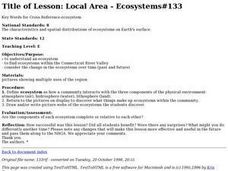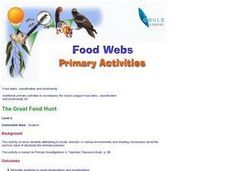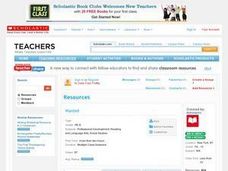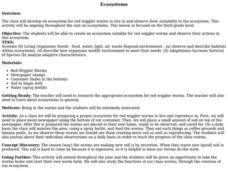Curated OER
Fish In The Web of Life
Students will develop skills of fish identification, correlate habitat characteristics with species present, develop a working vocabulary of Oneida fish terminology and fish names and discuss the relationship between a healthy ecosystem...
Curated OER
BIOME VIDEO Exchange Project
Students videotape information about the biome in which they live without naming it and send this to other students across the nation so they can guess which biome it comes from. Students include local ecosystems, information concerning...
Curated OER
Bats in My Backyard
Students investigate the importance of bats in the ecosystem and develop an understanding of the effect that humans have on bat populations. They research bats by reading articles while focusing understanding scientific writing. They...
Curated OER
Local Area - Ecosystems
Students examine ecosystems in the Connecticut River Valley. They view and discuss photos of ecosystems within their community, and create a picture web of an ecosystem.
Curated OER
Does a change in pH affect the growth and survival rate of aquatic plants?
Students determine if changes in pH affect the growth and survival rates of aquatic plants. They evaluate the optimal pH levels for the growth of aquatic plants.
Curated OER
Organic Materials in an Aquatic Ecosystem
Pupils evaluate the relationship between oxygen levels and the amount of organic matter in an aquatic ecosystem. They explain the relationship between oxygen levels, bacteria and the breakdown of organic matter using an indicator solution.
Curated OER
The Magic School Bus Gets Swamped
Students participate in an experiment that shows them how wetlands filter dirty water. They work in groups to accomplish this experiement with the help of supervisors. A bulletin board can be created to show the plants and animals that...
Curated OER
Ecosystems
Students role play as members of interest group with a stake in a local land use issue. In preparation for the town hall meeting, students research their issue and gather pertinent information to persuade their audience.
Curated OER
Connections
Students examine the interdependence of the West Central African forest ecosystem. They draw pictures of items found in this ecosystem, discuss their interdependence, and answer discussion questions.
Curated OER
The Great Food Hunt
Learners locate 'animals' in various environments and draw conclusions about the survival value of structures the animals possess. They create model macaroni animals and hide them and other teams of students find them and evaluate the...
Curated OER
Ecosystems Online
Students work together to gather information on ecosystems from websites. They identify plants and animals and create their own website. They are graded on their willingness to work together and the content on the website.
Curated OER
Home S-s-sweet Home The Eastern Massasauga Rattlesnake
Students investigate the eastern massasauga rattlesnake's habitat. They examine how the habitat allows the snake to survive by completing a variety of activities.
Curated OER
The Animals of Julie of the Wolves
Young scholars explore Arctic animal life through use of electronic resources. They discover facts about various animals that share that ecosystem with wolves.
Curated OER
Fisheries Research Methods
Students explore how scientists keep track of fish populations and why it is important to do so. They describe three methods currently used to sample fish populations. They participate in activities to simulate several of the sampling...
Curated OER
Land Use
Students examine ecosystems that covered Illinois 200 years ago, investigate some living and non-living components of ecosystems, identify components of prairie system, create food webs, and observe human effects on environment. Lessons...
Curated OER
"Habitats"
Young scholars complete a unit of lessons on animals and animal conservation. They observe a square meter of ground outside the school, set up a model environment, analyze an owl pellet, grow bread mold, and explore various websites.
Curated OER
Ecosystems
Third graders identify and define an Ecosystem and the basic needs of all animals. They collect pond water in a pickle jar. They observe the organisms that are in the jar to keep an ongoing record of the creatures and their population.
Curated OER
Wanted!!
Fourth graders study insects in their habitats looking at survival characteristics and whether the insect is a predator or an herbivore. They investigate characteristics that improve the survival of a species and its ability to reproduce.
Curated OER
Ecosystems
Third graders create an ecosystem for red wiggler worms to observe as they work on a complete unit.
Curated OER
The Web Of Life - Overlapping Food Chains
Learners perform an activity in which they discover what happens when food chains overlap in an ecosystem and discover the three components of a food web.
Curated OER
Web of Life - Ecosystem
Third graders play the roles of various organisms in an ecosystem (focusing on insects) and pass yarn or string around to other organisms from largest animals to the smallest. The end product is a web which shows how all of these animals...
Curated OER
Evaluate Ecosystems
Young scholars collect data from a field study. They write an environmental impact statement and design a plan to improve the ecosystem they have been observing. Finally, they give a presentation on the data and information they have...
Curated OER
2005 Hidden Ocean Expedition What's Eating You?
Analyze data and make inferences about the trophic position of organisms in the Canada marine food web. After a review of the geography and formula, discuss results and write an essay to improve the understanding of Artic food webs.
Curated OER
It Looks Like Champagne
Learners determine some practical implications of the discovery of liquid carbon dioxide in deep-ocean ecosystems. They interpret phase diagrams and explain the meaning of "critical point" and "triple point."

























